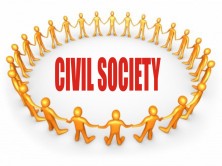 Mundo Real is a civil society organization. The concept of civil society is popular in policy and academic circles, however, in the US the phrase has not entered poplar vernacular to the degree it has in other areas of the world. This is ironic considering that some of the most prominent studies of civil society organizations originated in the US, which also has one of the world’s largest civil society sectors. In the US civil society organizations are usually referred to as nonprofit or civic organizations. Calling these entities nonprofit organizations is somewhat misleading, however, because many ‘nonprofits’, particularly the larger ones, manage million dollar budgets and have directors and staff earning six figure salaries. Also entities like universities, churches and other religious institutions are often considered nonprofits because they usually qualify for tax exemptions. Civil society organizations have been defined in many ways. Below is a fairly straightforward description of civil society organizations.
Mundo Real is a civil society organization. The concept of civil society is popular in policy and academic circles, however, in the US the phrase has not entered poplar vernacular to the degree it has in other areas of the world. This is ironic considering that some of the most prominent studies of civil society organizations originated in the US, which also has one of the world’s largest civil society sectors. In the US civil society organizations are usually referred to as nonprofit or civic organizations. Calling these entities nonprofit organizations is somewhat misleading, however, because many ‘nonprofits’, particularly the larger ones, manage million dollar budgets and have directors and staff earning six figure salaries. Also entities like universities, churches and other religious institutions are often considered nonprofits because they usually qualify for tax exemptions. Civil society organizations have been defined in many ways. Below is a fairly straightforward description of civil society organizations.
Every country (and regions within countries) must organize socially and economically in ways allowing them to properly function. This manner in which a society organizes is based on philosophical, ideological and/or religious viewpoints. Today there are only three options available in regards to socio-economic organization, and all societies blend these areas in varying degrees. The three sectors of society are the state, the market and civil society. In Cuba the state, or the government, regulates most if not all of the economic and social institutions. There is limited free market and civil society organization activity in Cuba. In the United States there is a strong tradition of trying to limit the size of government, especially the federal government, while allowing the market and civil society organizations to play historically large roles in the economy and social life. Certain Scandinavian countries have highly mixed economies and social institutions, with vibrant free market activity coupled with high tax rates allowing for some of the world’s largest state provided societal safety nets. Scandinavian countries also have active civil society sectors, but most social services are provided for by the state. In countries like those of Scandinavia, or even Brazil, where the government plays a large role in organizing everyday life, civil society organizations are called non-governmental organizations (NGOs), to distinguish them from the state. In the US where the market, consumption and profit play decisive roles in society, civil society organizations are called nonprofits to distinguish them from private businesses with solely profit related goals.
Simply defined civil society organizations are comprised of people willingly working together around shared interests, beliefs, goals and values. Civil society groups, in theory, are independent from the state (government), the family and the market (private business); although in reality the lines between state, civil society, family and market are often complex and ambiguous. Civil society organizations commonly embrace a diversity of spaces, actors and institutional forms, varying in their degree of formality, autonomy and power. Civil society includes organizations such as registered charities, community groups, women’s organizations, faith-based organizations, professional associations, college fraternities/sororities, trade unions, self-help groups, development non-governmental organizations (NGOs), social movements, business associations, coalitions and advocacy groups. Often civil society organizations are viewed as a means of limiting the government’s role in regulating social life and as promoting general responsibility of individuals to act in the interests of the community and/or in the interests of the objectives being targeted. Mundo Real views civil society organizations as a means to complement the work of the state and the market in order to better society, while not aiming to limit anything except injustice and corruption.
Mundo Real believes that regular people working together can realize remarkable things and create positive and lasting changes in society. Groups as ideologically diverse as the Tea Party (at least before it politicized and corporatized), Amnesty International, community bowling leagues and Brazil’s Landless Peasants Movement all fit into the diverse spectrum of civil society organizations. Once more, some believe that civil society organizations stand in opposition to government regulation of everyday life. Mundo Real views them, especially community groups and other grassroots organizations, as assisting governments in better fulfilling their social obligations, while also holding them accountable. Civil society organizations work alongside or in collaboration with governments, corporations or even other civil society groups. In the US small civil society organizations usually depend heavily on funding from private individuals, families and philanthropic foundations, with less reliance on public funding. In Brazil, where most of Mundo Real’s work is located, the majority (but certainly not all) of the resources civil society groups receive come from the government.
Hopefully this cleared up doubts on civil society and its organizations. Often these organizations require extravagant funding in order to pay salaries to their directors and staff. For two years Mundo Real has not used a single penny to pay salaries. We are an entirely voluntary organization driven by our firm belief in the work we are engaged in. Obviously we have expense and we appreciate support assisting with them, but we are proud that these expenses are entirely aimed at helping others and not for personal profit. The last four years have proved to us the importance of community-based organizations, local leadership and other types of civil society organizations. Ordinary people and community residents working together to better society are among the strongest and most rewarding traits of democracy.
